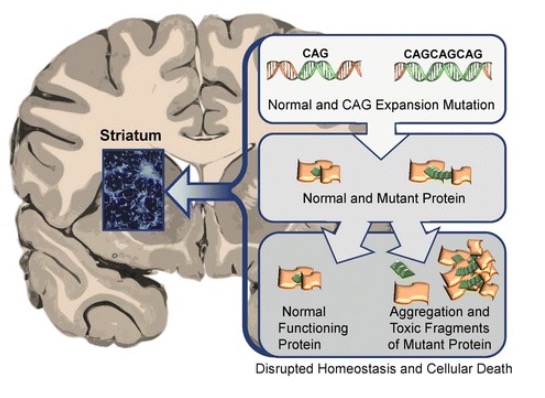Playlist
Show Playlist
Hide Playlist
Resulting Condition: Huntington's Disease
-
Slides Cellular Pathology - Degradation.pdf
-
Reference List Pathology.pdf
-
Download Lecture Overview
00:00 Okay, there's a disease. Of course, there's a disease. 00:03 That's what this is all about. 00:05 Basic cell biology, when it goes wrong, leads to disease at a very basic level. 00:11 So, this disease is Huntington's disease. 00:13 And this is due, we think, to defective autophagy. 00:17 So, what happens is that we get accumulation of the huntingtin protein. 00:22 And I'll show you that on the next slide and why we get it, accumulation, why it's misfolded. 00:27 But that protein, because it's accumulating and in a misfolded state, it isn't being degraded, unfortunately, and it limits the formation and the accumulation of the organelles within the autophagosome. 00:40 So, we end up with empty autophagosomes. 00:43 And we never get rid of senescent organelles or large denatured proteins. 00:49 So, we still get the lysosomal fusion, but nothing is happening because of that huntingtin accumulation. 00:57 Let's see what that looks like on the next slide. 00:59 So, we end up basically not degrading old stuff. And that's a problem. 01:03 So, in Huntington's disease, this -- it's -- a number of diseases are like this. 01:10 There are triplet repeats that normally code for an amino acid. 01:15 So, in the normal Huntington's gene, there are CAG repeats that code for glutamine. 01:22 Well, that's fine. And you normally have, in a healthy gene, between 10 and 26 repeats of that CAG. For reasons not yet completely worked out. 01:33 In Huntington's disease, we get expansion of that CAG repeat. 01:38 So, you get the triplet repeat that gets longer and longer and longer with each generation, and we get longer and longer sequences of glutamine. 01:46 And all that glutamine leads to a misfolded huntingtin protein. 01:52 So, now, we have this accumulation of this misfolded protein. 01:57 And you see that aggregate there. 01:59 And that's going to block the formation of the autophagosome. 02:03 So, we can't get rid of the old senescent organelles. 02:06 And as a result, the neurons don't have appropriate cell turnover. 02:11 They end up with defective mitochondria that are senescent and not making ATP appropriately, and you get atrophy, the neurons die. 02:17 So, on the left-hand side is a representation of a normal brain. 02:21 On the right-hand side, we've had massive atrophy over the course of three, four, five decades. 02:28 And we've lost neurons just because we didn't have appropriate autophagy. 02:33 And with that, we've talked about degrading little things and the importance of that, talked about the degrading of big things and the importance of that.
About the Lecture
The lecture Resulting Condition: Huntington's Disease by Richard Mitchell, MD, PhD is from the course Cellular Housekeeping Functions.
Included Quiz Questions
Which of the following is involved in the pathogenesis of Huntington's disease?
- Accumulation of huntingtin protein
- Expansion of the CCG trinucleotide repeats
- Elevated levels of lysosomal enzyme activity
- Defective cleaving of the amyloid precursor protein
- Decreased synthesis of the huntingtin protein
Customer reviews
5,0 of 5 stars
| 5 Stars |
|
3 |
| 4 Stars |
|
0 |
| 3 Stars |
|
0 |
| 2 Stars |
|
0 |
| 1 Star |
|
0 |
Greatings from Rio Grande do Sul, Brasil. Great lecture, profesor. I like very much of your classes, this particularly, it is helping me a lot within a presentation that i have to make at my medical school.
Great lecture! It was very explanatory. I enjoyed the lecture and was properly informed. I look forward to getting enlightened by your other lectures. I am so happy that I joined Lecturio. I wish more people out there are aware of Lecturio and subscribed to it. I wish I had joined it way back. Thank you.
The lecturer teaches very well. He made the topic very easy. I liked it very much.




